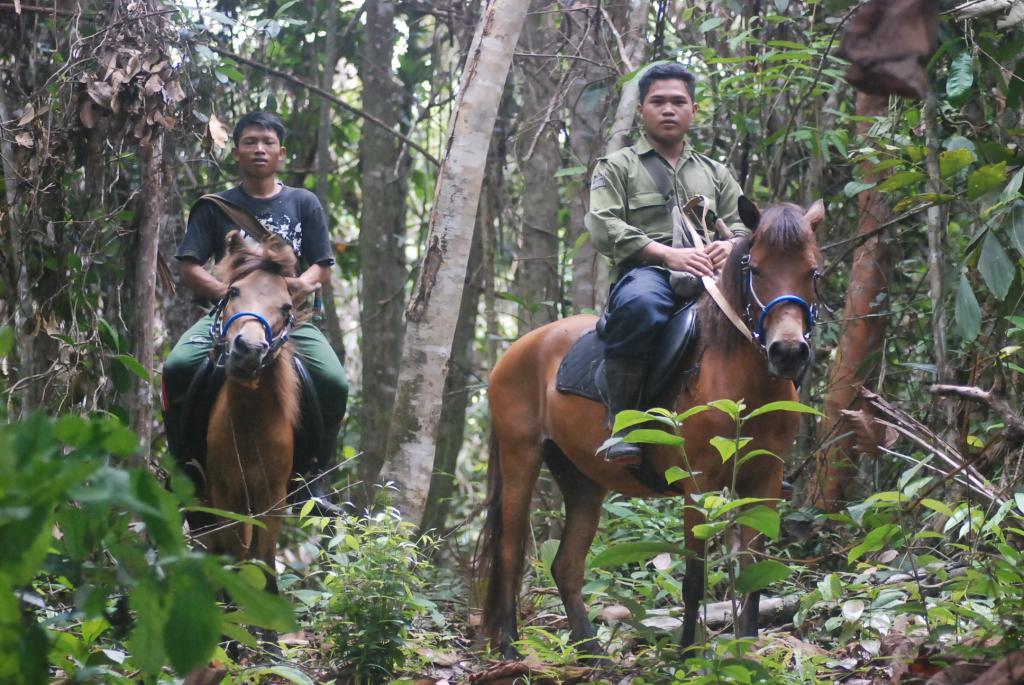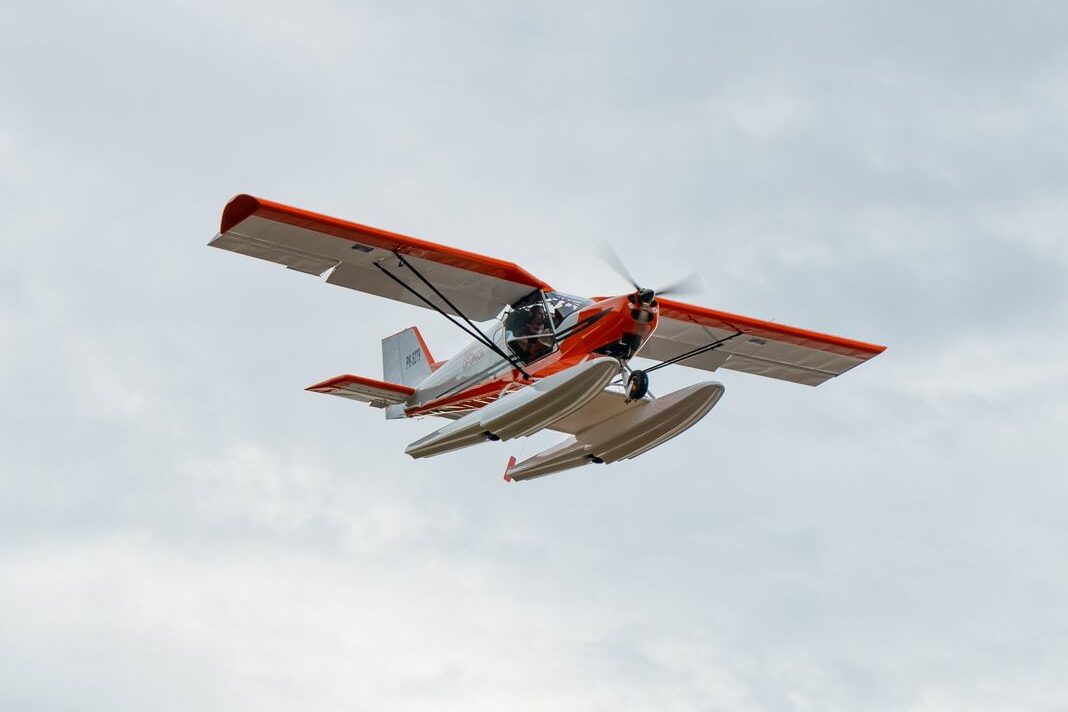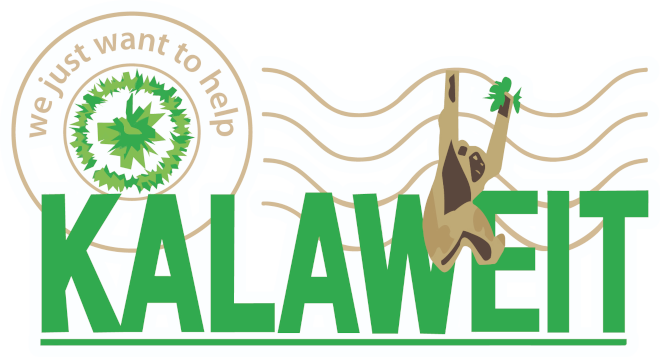Forest protection
Protect forest and wildlife.
To save Borneo and Sumatra’s wildlife, Kalaweit works with the local populations. to ensure the long term protection of these areas, with no limit in time.
Forest management is provided by ANUA (Aksi Nyata Untuk Alam), while Borneo Flying Club is responsible for forest monitoring. These two structures led by Chanee and his son Andrew are closely linked to Kalaweit and act for the same purpose.
Concrete action ensures success
Close collaboration with the villagers and the authorities allows us to secure more and more lands.
We make sure that the forests belong to the local communities. Regular meetings are organized with the mayor, the village chief and the families to set up the protection of the area and organize the follow-up
The villagers still retain access to the land for their traditional activities (fruit picking, the collection of rattan and rubber), but they cannot cut down trees or hunt. The areas protected by the association are passed back to local communities
Boundary signs are placed every 20/30 meters along the periphery of the protected area. Guard posts are placed at strategic points such as entrances, water sources or in the most elevated areas.
The surveillance of the forests is ensured by daily patrols. They are ensured by our forest rangers, hired from villages bordering the area. These job creations strengthen our ties with the villagers. Patrols, both equestrian and aerial (drone, paramotor, seaplane) allow us to detect any suspicious activity.
To date, no illegal activity has been observed in those areas. This proves the effectiveness of our monitoring program, but above all testifies to our good relationship with the villagers and their support.
Viewing videos from camera traps placed in these areas, allows us to have a better understanding of the multitude of species present. It also allows us to observe their behaviour, their movements and interaction with other species.
We do not release gibbons into those forests. No additional pair of gibbons could find enough territory for their needs due to the lack of space. Natural habitat is shrinking drastically from year to year, yet the gibbons are territorial and cannot share their territory with other pairs. This is necessary to protect the populations of wild animals that are still free.
Protecting forests is an emergency in regions of the world ravaged by deforestation. Our approach is concrete, fast and effective.
The size of these protected areas increase regularly according to the amount of support we receive. Your help is essential to secure more lands and more animals. Each donor for Dulan or for our other forest reserves receives a symbolic document with their name, the amount of the donation and the area in square meters of lands thus secured.


Borneo Island
Central Kalimantan region, Barito Utara District
Dulan

It is 25 minutes from our Pararawen base camp and covers 2 067,5 hectares. It is located in a 2,500 hectare forest including a lake, which Kalaweit wishes to protect the totality. But this forest is surrounded by several palm oil and coal mining companies and by a track belonging to a forestry company.
It is a refuge for animals, particularly for a hundred orangutans who have escaped deforestation. The extreme diversity of the forest, a mosaic of ancient primary and secondary forest, makes it possible to shelter a large number of individuals of each species: white-bearded gibbons (about 200 individuals), 2 species of langurs, Malaysian sun bears, clouded leopards, proboscis monkeys, pigtail macaques, crab-eating macaques, sambar deer (a species that has become rare), muntjacs etc.
The forest belongs to families from the village of Butong, who fish in the lake. If the forest is degraded by human activity, the lake will inevitably become polluted and fishing activities will be compromised. To preserve this essential activity and continue living in their village, the villagers want this forest to be protected from destruction and are working with us towards this goal.
Pararawen

It borders our Pararawen camp, and covers 304 hectares. It is a secondary forest, located 40 meters above sea level. Some traditional rubber plantations are found there.
Several groups of more than fifty individuals of proboscis monkeys live there. It is an endangered species of monkey endemic to Borneo. 30% of its’ territory is located within this area. Our objective is to save the remaining 70% in order to secure them for the long term. This will allow these monkeys that have become rare as well as other species (binturong, macaques, gibbons, civets etc.) to have place to live.
This protected area consists of 2 sections:
- One part protected with the help of Brigitte Bardot Foundation (in blue) that helped to protect more than 80 hectares of forest ;
- Another part protected with the support of Kalaweit’s friends (in yellow).
These two areas continue to grow from year to year.
The Pararawen location
It is located opposite to the Pararawen camp, on the opposite side of the Barito river, which borders the Kalaweit camp, and covers 5,800 hectares. Half of the area is constituted of primary forest. A large population of wild gibbons has been observed there. We provide aerial surveillance for it.
This area has the status of sanctuary or “Cagar Alam” in Indonesian. It is assigned by the K.L.H.K. (Ministry of Environment and Forestry). It has extensions in the Indonesian provinces named K.S.D.A. (Konservasi Sumber Daya Alam). Kalaweit and the K.L.H.K. of Jakarta are therefore partners in the management of the Pararawen aera via the K.S.D.A. Together they collaborate by establishing an annual work plan.
Sumatra Island
Sumatra Barat region, Solok District
Supayang
It is located in the west of Sumatra and covers 535,1 hectares. With the help of local communities, Kalaweit wishes to protect 300 additional hectares. About fifty hectares have already been staked out by our team and the villagers. It is a primary and secondary forest, with a high conservation value. It is located between 600 and 1050 meters above the sea and is a rather steep area which, for the time being, makes it difficult for human exploitation.
It borders our Supayang camp and is very rich in biodiversity. It harbours gibbons, siamangs, bears, clouded leopards, golden cats oa Asia, pangolins, tapirs, Sumatran dhole, muntjacs and tigers! It is a rare opportunity to be able to protect a forest of this quality.
Today, it borders a forest of 20,000 hectares.
Our
care centers
Kalaweit collects and cares for animals rescued from wildlife trafficking.
Each treatment center is equipped with a veterinary clinic, a storage room for the animal’s food, buildings for our teams (kitchen, bedrooms, bathroom, guard post) as well as stalls our patrol horses.
These are closed to outside visitors.
In Borneo, our center is in the village of Pararawen, a day’s drive from the city of Palangkaraya. The one in Sumatra is in the village of Supayang, a three-hour drive from the city of Padang. Both are located on our own land, close to our reserves.
Hundreds of animals under our responsibility
More than 350 animals are currently distributed throughout our 3 centers. They are mainly gibbons and siamangs, but also bears, crocodiles, macaques, civets, loris, etc.
All come from the wildlife trade and are confiscated by the Forestry Department which entrusts them to us. Sometimes the owners agree to give them to us directly.
The Kalaweit care centers are managed by Yayasan Kalaweit Indonesia, sister organisation of Kalaweit France.
We never buy animals, it is our golden rule, because buying an animal will keep the wildlife trafficking going.
They arrive in Kalaweit weak and stressed. Many are traumatized and have never seen another animal of their own species. They often suffer from malnutrition and require treatment.
Their new life begins with several weeks of quarantine allowing our veterinary team to assess their state of health and set up an adapted care protocol. Once the quarantine is over, our new residents will be able to join the appropriate infrastructures.
Concerning gibbons and siamangs, our priority is to find the right life partner for each of them, as soon as they leave quarantine.
They are monogamous animals which do not tolerate solitude. Pairing the animals together is delicate with the risk of sometimes aggressive confrontation. Due to our experience, we get positive results most of the time. Unfortunately, some individuals have suffered too much psychologically, refusing all partners and must remain alone in their aviary.
In addition, the frantic pace of deforestation makes each release extremely complex. Gibbons, especially, need space. Each pair needs a territory of at least 12 hectares, much more (20, 30, 40 hectares, etc.) if the forest is degraded.
The vast majority of the gibbons ans siamangs collected will never leave Kalaweit.
They are unable to cope in the wild, disabled or infected with human diseases such as Herpes Simplex, or Hepatitis A or B.


The infrastructures
Gibbons are very territorial and are installed in large aviaries, all distant from each other.
The vegetation, consisting of large trees, is left intact between the aviaries to limit the stress caused by the visual contact between the pairs. These are double diamond-shaped aviaries, equipped (ropes, branches, etc.) and fitted with a removable partition in the middle to separate the partners if necessary.
Each is 12 meters long by 6 meters high and has an integrated quarantine area. In case of illness, this allows us to easily isolate one of the gibbons without taking him / her away from his / her partner which accelerates their healing. The pairs are very united, and any separation is a great stress factor for the animals. Youngsters (under the age of 7) are grouped together in socialization cages before they are paired off.
The crocodiles are placed in 5 pens, with large pools. The enclosures can be connected together or isolated. Electric fences have been installed at the interior limits of the enclosures of potentially dangerous animals (bears, crocodiles) to prevent them escaping.
The bears are grouped in several enclosures of 15 by 25 meters which are linked to each other. Each enclosure has a pool and furnishings (tires, rest platforms) and the enclosures may or may not be connected to each other.
The other animals (macaques, loris, birds, etc.) are systematically placed in enclosures adapted to their needs.
The installations run entirely on solar energy.
Each center is run by a manager…
who supervises a team composed of carers, veterinarians, guards, cooks and masons.
The animals are fed twice a day, which requires regular supplies of fruit, vegetables, etc. More than 5 tonnes of food are delivered to Kalaweit every week!
Teams of masons are constantly working on the repair and construction of new infrastructure. Building an aviary takes a month of work and a budget of € 3,000.
We continually require funds in order to accommodate as many gibbons as possible. Despite their captivity, we strive to provide the best possible living conditions to all these victims of mankind’s actions. It is a great responsibility for Kalaweit with truly long-term commitment.
